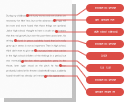《新GRE写作论证论据素材大全》行为类(二)
作者:韦晓亮 来源:极致批改网 2014-03-12
主要论证论据素材包括:选择的定义、选择的自由性、选择理论的十大公理、选择的自由性、影响自由意志的两大因素: 意识和下意识、弗洛伊德观点: 影响决策的三大要素、弗洛伊德观点: 选择的自由性及阻止自由意志的三大因素、人的局限性、征服是人的局限性的结果、自我控制、自我意象的概念、影响自我意象的四大因素、自我意象与思维模式、自我意象与动机和世界观。
15 选择的定义
Are we free to make our own choices? To answer the question, we must first cut the fat off thewidely used definition of choice. Defining choice in this situation can be a difficult task. A populardefinition of choice could be a mental process through which an individual weighs theconsequences of their actions to create an ideal image of their preference to the outcome of theiractions. But, when you look at this definition, you see that it suggests that someone who fails tocarefully analyze their actions doesn‟t actually make choices. Can we assume by this definitionthat choices are free? We can say yes, because according to this definition, if we do carefullyanalyze our actions, we create the outcome that we choose.
16 选择的自由性
Some people may say choice is not free. They may say that if we do not reflect carefully on ouractions, we are not taking responsibility for them, leaving the cause of the action to some otherforce. When looking at the word responsibility in the one side of the argument, one may still drawup a few questions that need to be explained. If we are ignorant of our own responsibility in taking a course of action, how are we to know that we are not reflecting carefully on our actions? Whatare the standards of responsibility when reflecting on our actions? What if we do something thatwe do not know is wrong? To answer these criticisms, ignorance of our actions is natural andcannot affect our ability to rationalize to the best of our ability. In a given situation where it is impossible to know what is best, we have the ability to do what we think is best in that givensituation. Assuming that an individual has the power to think about and carefully consider choices,they do have a free will within them that they can bring out in any situation, even if the person hasno knowledge of what to do in that certain situation.
17 选择理论的十大公理
The Ten Axioms of Choice Theory:The only person whose behavior we can control is our own.All we can give another person is information.All long-lasting psychological problems are relationship problems.The problem relationship is always part of our present life.What happened in the past has everything to do with what we are today, but we can onlysatisfy our basic needs right now and plan to continue satisfying them in the future.We can only satisfy our needs by satisfying the pictures in our dream.All we do is to behave.All behavior is Total Behavior and is made up of four components: acting, thinking, feelingand physiology. All Total Behavior is chosen, but we only have direct control over the acting and thinkingcomponents. We can only control our feeling and physiology indirectly through how we choose toact and think. All total behavior is designated by verbs and named by the part that is the most recognizable.
18 选择的自由性
(Are we free to make our own choices?) Pre-destination can often bring up the question as towhether we as humans control our own actions. Are we free to make our own choices, or iseverything we do pre-determined by a supernatural being of some sort? Is it safe to say that we areresponsible for our own choices? Do we own a free will that allows us to choose our life path, orare our actions pre-determined, making our exertions useless? We do have a free will and are quite able to make our own choices.
19 影响自由意志的两大因素: 意识和下意识
There are two popular elements, the conscious and the unconscious. The conscious representsthings we are aware of, and the unconscious represents what we are not aware of. When we areconscious, we are aware from moment to moment in our ordinary everyday experiences. Forexample, when at work, I am aware of everyone and everything in my environment, phones, faxmachine, co-workers, and computers. I will know who is at work and who is not. I know who haspictures of their children on their desk and who does not. The conscious element simply allows meto see, feel, and actively be aware. The unconscious is a powerful element which affects anddrives memories and motives. The unconscious represents an area that is much deeper than thesurface of our mind. An obvious example of the unconscious is our dreams. The unconscious says things about our lives through pictures and symbols. This element, if recognized, will prevent freewill from occurring and can directly affect our behavior. Thus, the unconscious is a powerful forcethat affects almost everything we do.
20 弗洛伊德观点: 影响决策的三大要素
Sigmund Freud proposes three aspects of our personality structure that directly effects ourdecisions. The elements that Sigmund Freud talks about are the Id, Ego, and Super Ego. Thesethree elements play an important role in our decisions and support the view of not having free will.The Id is the source of our basic drives and all of our psychological energy. Sigmund Freud alsostates that we all are born with this element. The Id is also refereed to the pleasure principle,which also represents self-gratification. The Id has two basic drives—sex and aggression. The Idis the part of us that is seeking pleasure through the immediate satisfaction of its needs. Inreference to the Id, it is always trying to satisfy every impulse whenever and wherever, it knowsno limits.
The second element of our personality is the ego; Freud relates this as the reality principle. Theego is the practical side of our personality; it is aware of what‟s possible and impossible and isable to accept limits and to act in a practical way. The ego‟s main purpose is to figure outappropriate ways to satisfy the id‟s desire.
In a sense, the ego is like congress and the id the president. The president can not take majoractions without the approval of congress. In short, the id supplies the power and the ego suppliesthe control. The reaction of the two acts as a driving force in which our decisions are made, thuseliminating free will.
21 弗洛伊德观点: 选择的自由性及阻止自由意志的三大因素
People are not free and do not have free will due to unseen forces within the human mind andareas of the unconscious which is not aware to us. There are arguments that go against theprinciple of free will in reference to the unconscious. Many people who have done studies in thisarea conclude that the unconscious can be seen or measured, so it is able to exist.
According to Sigmund Freud, the unconscious does exist and the areas of the human mind controland affect our behavior. Freud also states that because of these forces, free will is prevented. Freudproposes three aspects of our personality that prevent free will. They are the Id, Ego, and theSuper Ego. Many People feel they are free and possess free will. They do not feel that somemechanism in their mind is the basis for their behavior and actions. They feel that they have theability to size up a situation, think about their options, and choose how they will act. What we dothen, is the result of our own deliberate free choice. There are unseen forces that prevent free will.These unseen forces along with other factors prevent us from acting freely.
22 人的局限性
History has taught us that from the advent of time, man has proven himself to be his own worstenemy. Throughout history, various controversies and disputes have progressed into major warswith devastating effects. Some people believe that these are the subsequent results of increasingpower in man. To many, it may seem that the acquisition of varying degrees of power andinfluence cause marked changes in otherwise placid personalities. The more power one has, themore he wants and, what is worst, he is never satisfied. This mentality, however, is not accelerated by power, but rather by an inner drive which comes as a result of one‟s limitations.
23 征服是人的局限性的结果
Disputes and world conquests are not manifestations of human power, but the inevitable results ofhuman limitations. Along with power comes a keener sense of security and self-confidence which,when threatened by others or discontented factors, becomes the basis for disputes and worldconquests. This takes shape when an individual has reached his or her limitations as a humanbeing. An individual‟s limitations can be regarded as his or her imperfections, which is the bridgethat separates man from the supreme beings. These limitations encompass the lack of ability todeal with moral, emotional, mental and physical predicaments. These can be further categorized asinsecurity, poverty, fear, lust, greed, and lack of knowledge among other things. These are thelimitations that are present in a human being, and that actuates him or her to abuse and misusepower. With the absence of these limitations, there would be no compulsive ordinance for anydisputes and conquests, because an individual‟s emotions and confidence would then be directedtowards compromise. If an individual is confined to accept reality as it is, then he or she will beled into having an egocentric mentality, which will be transformed into disputes.
24 自我控制
The self-control of motivation is increasingly understood as a subset of emotional intelligence; aperson may be highly intelligent according to a more conservative definition (as measured bymany intelligence tests), yet unmotivated to dedicate this intelligence to certain tasks. Yale Schoolof Management Professor Victor Vroom‟s “expectancy theory” provides an account of whenpeople will decide whether to exert self-control to pursue a particular goal.
25 自我意象的概念
Self-efficacy is an impression that one is capable of performing in a certain manner or attainingcertain goals. It is a belief that one has the capabilities to execute the courses of actions required tomanage prospective situations. Unlike efficacy, which is the power to produce an effect (inessence, competence), self-efficacy is the belief (whether or not accurate) that one has thepower to produce that effect. For example, a person with high self—efficacy may engage in amore health related activity when an illness occurs, whereas a person with low self-efficacy wouldresult in feelings of hopelessness.
It is important here to understand the distinction between self-esteem and self-efficacy.Self-esteem relates to a person‟s sense of self-worth, whereas self-efficacy relates to a person‟sperception of their ability to reach a goal. For example, say a person is a terrible rock climber.They would likely have a poor self-efficacy in regard to rock climbing, but this wouldn‟t need toaffect their self-esteem; most people don‟t invest much of their self-esteem in this activity.
26 影响自我意象的四大因素
Four sources affecting self-efficacy:
1. Experience
“Mastery experience” is the most important factor deciding a person‟s self-efficacy. Simply put,success raises self-efficacy, and failure lowers it. “Children cannot be fooled by empty praise and condescending encouragement. They may have to accept artificial bolstering of their self-esteem in lieu of something better, but what I call theiraccruing ego identity gains real strength only from wholehearted and consistent recognition of realaccomplishment, that is, achievement that has meaning in their culture.”
2. Modeling—“Vicarious Experience”
“If they can do it, I can do it as well.” This is a process of comparison between a person andsomeone else. When people see someone succeeding in something, their self-efficacy will increase;and when they see people failing, their self-efficacy will decrease. This process is more effectualWhen the person sees themselves as similar to his or her model. If a peer who is perceived ashaving similar ability succeeds, this will likely increase an observer‟s self-efficacy. Although notas influential as past experience, modeling is a powerful influence when a person is particularlyunsure of him- or herself.
3. Social Persuasions
Social persuasions relate to encouragements/discouragements. These can have a strong influence—most people remember times where something said to them significantly altered theirconfidence. When positive persuasions increase self-efficacy, negative persuasions decrease it. Itis generally easier to decrease someone‟s self-efficacy than it is to increase it.
4. Physiological Factors
In unusual, stressful situations, people commonly exhibit signs of distress: shakes, aches and pains,fatigue, fear, nausea, etc. A person‟s perceptions of these responses can markedly alter a person‟sself-efficacy. If a person gets “butterflies in the stomach” before public speaking, a person withlow self-efficacy may take this as a sign of their own inability, thus decreasing their efficacyfurther. In contrast, a person with high self-efficacy is likely to interpret such physiological signsas normal and unrelated to his or her actual ability, which will continue to be seen as a disregardfor trembling hands, etc. Thus, it is the person‟s belief on the implications of their physiologicalresponse that alters their self-efficacy, rather than the sheer power of the response.
27 自我意象与思维模式
Low self-efficacy can lead people to believe tasks are harder than they actually are. This oftenresults in poor task planning, as well as increased stress. Observational evidence shows that peoplebecome erratic and unpredictable when engaging in a task in which they have low efficacy. On theother hand, people with high self-efficacy often take a wider picture of a task in order to take thebest route of action. People with high self-efficacy are shown to be encouraged by obstacles togreater effort. Self-efficacy also affects how people respond to failure. A person with a highefficacy will attribute the failure to external factors, where a person with low self-efficacy willattribute failure to low ability. For example, a person with high efficacy in regards to mathematicsmay attribute a poor result to a harder than usual test, feeling sick, or lack of effort. A person witha low efficacy will attribute the result to poor ability in mathem-atics.
28 自我意象与动机和世界观
Motivation:
People with high self-efficacy in a task are more likely to spend more effort, and persist longerthan those with low efficacy. On the other hand, low self-efficacy provides an incentive to learnmore about the subject. As a result, someone with a high efficacy may not prepare sufficiently fora task.
The Destiny Idea:
People of differing self-efficacy perceive the world in fundamentally different ways. People with ahigh self-efficacy are generally of the opinion that they are in control of their own lives; that theirown actions and decisions shape their lives. On the other hand, people with low self-efficacy maysee their lives as somewhat out of their hands.
批改及润色体验馆 想知道您的作文、口语、文书将如何被我们的专家批改及润色吗? 查看更多
 马上体验口语批改
马上体验口语批改
 马上体验作文批改
马上体验作文批改
 马上体验文书润色
马上体验文书润色
作文题库:
托福-综合写作 托福-独立写作 雅思-小作文 雅思-大作文 GRE-Issue GRE-Argument GMAT-Argument SAT-Essay ACT-McGraw-Hill ACT-历年代表性作文题目考研-小作文 考研-大作文 四级-作文 六级-作文 专四-大作文 专四-小作文 专八-作文 高考-新课标一 高考-新课标二 高考-北京 高考-天津 高考-广东 高考-四川 高考-辽宁 高考-安徽 高考-福建 高考-湖南 高考-湖北 高考-陕西 高考-浙江 高考-山东 高考-上海 高考-重庆 高考-江苏 高考-江西 高考-杭州外国语学校 高考-郑州四中 高考-章丘
口语题库:
托福-Question 1 托福-Question 2 托福-Question 3 托福-Question 4 托福-Question 5 托福-Question 6 雅思-Part 1 雅思-Part 2 雅思-Part 3求职面试-500强企业高频通用英文面试题目100道 求职面试-各大企业常用场景英文面试题目
签证面签-你是谁 签证面签-你去做什么 签证面签-你有能力去做吗 签证面签-你会回来吗
留学面试-关于学校及专业 高考-高考口语
文书润色:
留学文书 学术论文 商务文书 求职文书 课程作业 书稿润色 学术论文试用 学术论文摘要文章推荐
- 《新GRE写作论证论据素材大全》艺术类(二)
- 《新GRE写作论证论据素材大全》艺术类(三)
- 《新GRE写作论证论据素材大全》艺术类(一)
- 《新GRE写作论证论据素材大全》文化类(三)
- 《新GRE写作论证论据素材大全》文化类(二)
- 《新GRE写作论证论据素材大全》文化类(一)
- 《新GRE写作论证论据素材大全》政治类(二)
- 《新GRE写作论证论据素材大全》政治类(一)
- 《新GRE写作论证论据素材大全》学习类(四)
- 《新GRE写作论证论据素材大全》学习类(三)
- 《新GRE写作论证论据素材大全》学习类(二)
- 《新GRE写作论证论据素材大全》学习类(一)
- GRE Argument 168 范文+逐段点评+全篇总评
- 《新GRE写作论证论据素材大全》科技类(三)
- GRE Argument 152 范文+逐段点评+全篇总评
- GRE Argument 160 范文+逐段点评+全篇总评
- 《新GRE写作论证论据素材大全》科技类(二)
- GRE Argument 135 范文+逐段点评+全篇总评
- GRE Issue 104 (107) 范文+逐段点评+全篇总评
- 《新GRE写作论证论据素材大全》科技类(一)
- GRE Argument 132 范文+逐段点评+全篇总评
- 《新GRE写作论证论据素材大全》教育类(三)
- GRE Issue 123 范文+逐段点评+全篇总评
- GRE Argument 142 范文+逐段点评+全篇总评
- 《新GRE写作论证论据素材大全》教育类(二)
- GRE Issue 143 范文+逐段点评+全篇总评
- GRE Argument 170 范文+逐段点评+全篇总评
- 新GRE写作论证论据素材大全》教育类(一)
- GRE Issue 114 范文+逐段点评+全篇总评
- 【GRE Argument 113 范文+逐段点评+全篇总评】
- 《新GRE写作论证论据素材大全》行为类(三)
- GRE Issue 101 范文+逐段点评+全篇总评
- GRE Argument 109-110 范文+逐段点评+全篇总评
- 《新GRE写作论证论据素材大全》行为类(二)
- GRE Issue 89 范文+逐段点评+全篇总评
- GRE Argument 101 范文+逐段点评+全篇总评
- 《新GRE写作论证论据素材大全》行为类(一)
- 《新GRE写作论证论据素材大全》社会发展类三
- 《新GRE写作论证论据素材大全》社会发展类二
- GRE Argument10范文+逐段点评+全篇总评
- GRE Issue8范文+逐段点评+全篇总评
- GRE Issue13范文+逐段点评+全篇总评
- GRE Argument8范文+逐段点评+全篇总评
- GRE Issue7范文+逐段点评+全篇总评
- GRE Issue4范文+逐段点评+全篇总评

使用有问题?请联系我们的在线专家
工作时间:09:00AM - 08:00PM
 专家在线
专家在线





